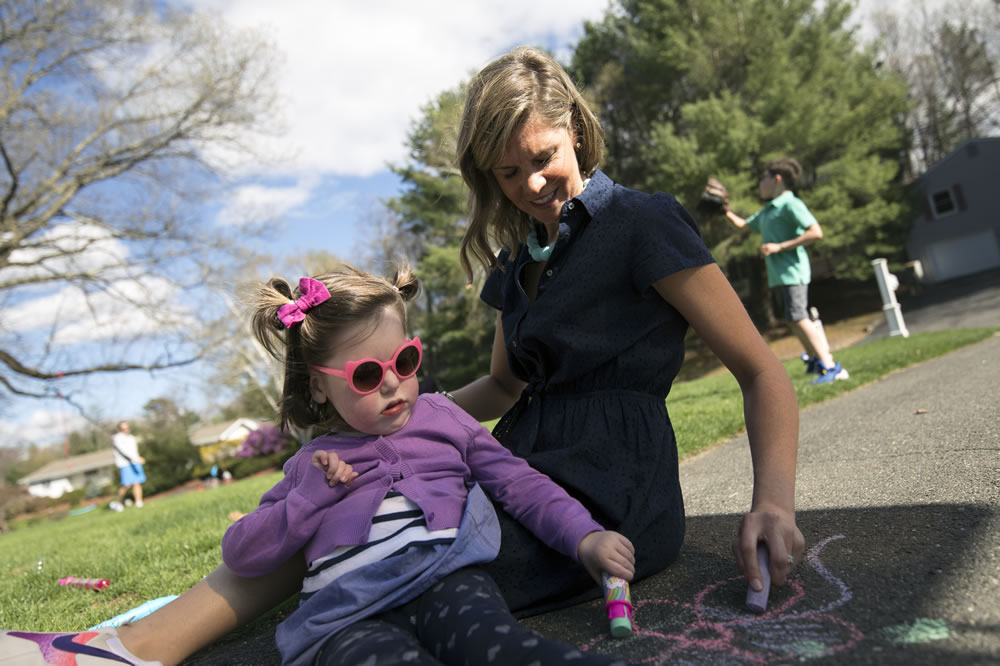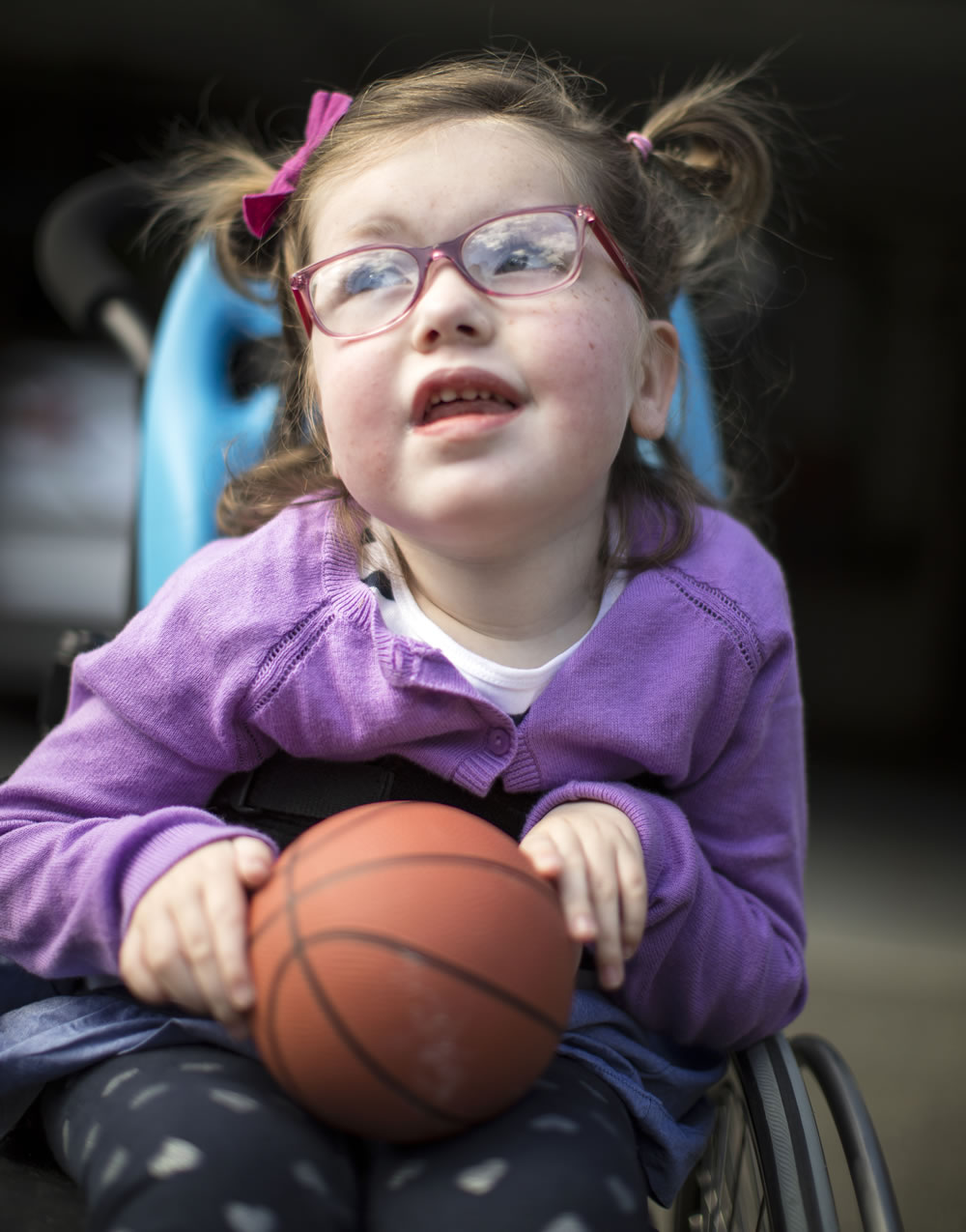Illuminating Unseen Dimensions
Into the Light
When Jordan Arnold’s parents enrolled her in a Spinraza trial, they had no idea how brightly her future would shine.

“Hello!”
5-year-old Jordan Arnold announces her presence to the room as Diane, her physical therapist, takes out the toys for today. “Mommy watch this,” Jordan yells from her wheelchair in excited anticipation of showing off her skills. With some assistance, she is able to pull herself forward, lengthening her body along the curvature of a big red ball. With the ball supporting her weight horizontally, she floats unencumbered by gravity.
“I love seeing you so tall,” responds Jenny, Jordan’s mother, ecstatic with her triumph. “Let’s do it again,” Jordan exclaims, picking up on her mom’s delight. The milestones have been many recently for Jordan — she's been progressing steadily in her physical abilities, contrary to her disease.
Jordan was born with spinal muscular atrophy (SMA) type 1, a motor neuron disease that has affected her overall growth and development but not her spirit. Caused by a mutation in her SMN1 gene, SMA type 1 has robbed Jordan of the SMN protein necessary to maintain healthy motor neuron cells. As nerve cells die, her muscles begin to atrophy, immobilizing her. Eventually, the most important muscles involved in eating and breathing are also affected, threatening irreversible damage and death. Type 1 is the earliest-onset form of SMA, and also the most severe.
Diagnosis notwithstanding, for Jordan’s parents, Jenny and Joel, there is much reason to rejoice in their daughter's current, relatively stable condition. Today’s progress was once unthinkable. Jordan has reached physical milestones — developing the ability to sit up and support the weight of her neck, and progress toward learning to eat on her own. But perhaps the best of all her achievements is communicating, and the incredible, boisterous way that she chooses to do so.
“We never thought she'd talk,” Jenny says. “But she talks. That's such a gift. She can advocate for herself.”
And advocate she does. “Faster,” Jordan directs as she balances on a seated swing, honing in on her core strength to maintain balance. “Come on, really fast!”
Says Joel, “Her personality is larger than life. The way she can engage with people who don't even know her is incredible. You can't teach that.”

Jordan's gregarious, outspoken nature has suited her well at home, at school, and in her local Maine community. As a young wheelchair user, Jordan is quick to remark on when she is being treated differently than others because of her appearance.
“She's going to change the world because she holds people accountable,” Joel says. He and Jenny have made sure to include Jordan in all possible family activities, enrolled her in public school, and encouraged her to socialize — speaking her mind.
“She does a phenomenal job just going with the flow,” Jenny says. “We didn't want to keep her in a bubble. We wanted her to be able to experience life. If we're going on a walk, she's coming. If we're going out to dinner, she's coming.”
Fighting for life
After Jordan was diagnosed at 2 months old, Joel and Jenny thought they would lose their baby girl. “Four years ago, SMA looked very different,” Jenny says. Following the diagnosis, the couple was not given many options other than palliative care. Jordan's life expectancy was extremely short.
“We made a choice early on that we were not going to grieve her while she was here,” Joel says. Jordan’s doctor told the Arnolds about a clinical trial to treat SMA type 1 at Boston Children's Hospital. Joel and Jenny debated the pros and cons, and eventually decided to take action. Jordan qualified for the trial, in which infants younger than 7 months could receive Spinraza (the FDA approved this disease-modifying drug in 2016).
“We were committed, one way or the other,” Joel says. “We were nervous and scared as well.” The family transformed their fear into energy, uplifted by the possibilities of Jordan receiving treatment.
Spinraza attempts to activate the SMN2 gene, which can produce a small amount of functional SMN protein, to stall cell death in the muscles of a person with SMA. During Jordan’s time in the trial, improvements were slow to transpire, and her parents feared Jordan ended up in the placebo group. Jordan got sick with pneumonia not once but twice, and the ordeal kept her family in the PICU. Very few physicians knew how to treat an SMA type 1 patient, and Joel and Jenny diligently educated the staff, augmenting her chances of survival.
Jordan recovered dramatically.
“After she survived her double pneumonia, that changed everything,” Jenny says. Jordan kept growing stronger.
A year later, spirits continued to rise. “We took a leap and left for warmer weather,” Jenny says. Instead of the family’s traditional Christmas visit up north, they drove to Florida and rented a house, a feat truly unthinkable the year before.
“I felt like we really accomplished something,” Joel says, alight with the memories of their holiday away. Since then, things have continued to slowly but surely improve.
“We are amazed at the timing of it all,” Jenny says. “That we got diagnosed and we found treatment in time. There is a future for her. We're excited.”
Growing together
In physical therapy, Jordan practices blowing bubbles, her eyes wide behind her pink-rimmed glasses. She dips the wand into the cup, holds it close to her lips, and sends more transparent orbs into space. Three months ago, her lungs were too weak to blow a single bubble. Today, she giggles as multiple bubbles ascend into the air, reflecting the joy and wonder in her eyes. Her therapist and mother stare in awe at the simplest of actions, watching this bright and bubbly girl able to show herself to the world, growing stronger in confidence and ability.
Jordan's family has restarted their lives with resilience and determination, adapting to new places, new communities, and new situations, while remaining focused on spending quality time together. “We've slowed down more,” Jenny says. “We spend more time together as a family. In the sense that Jordan's lucky to have us, we're lucky to have her. She's changed so much for us.”
Jordan continues to uplift everyone around her with her growth, development, and innate charisma. “I don't think we would be who we are today without Jordan and this affliction,” Joel says. “That’s the silver lining here, and I think we're giving the kids a better life because of it.”